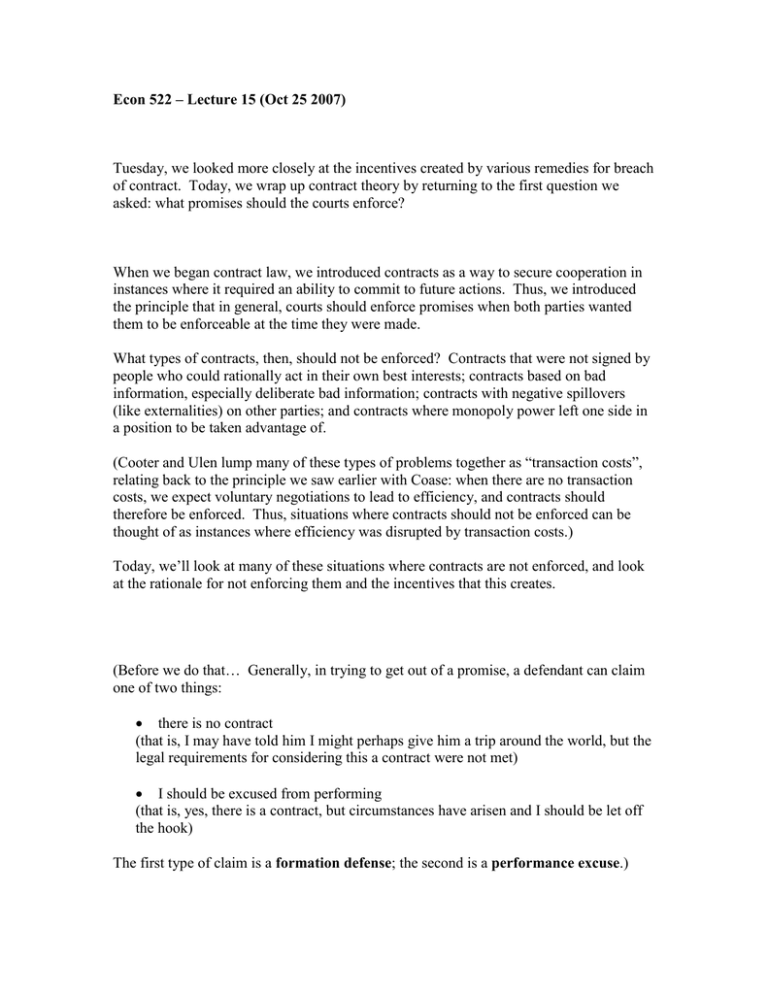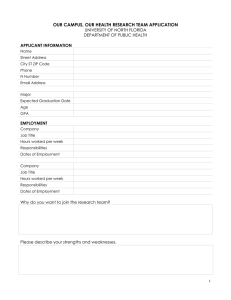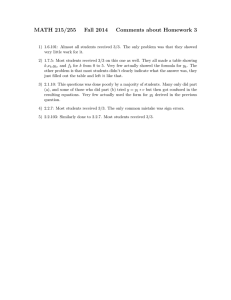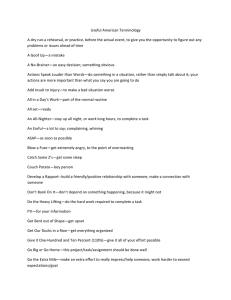Econ 522 – Lecture 15 (Oct 25 2007)
advertisement

Econ 522 – Lecture 15 (Oct 25 2007) Tuesday, we looked more closely at the incentives created by various remedies for breach of contract. Today, we wrap up contract theory by returning to the first question we asked: what promises should the courts enforce? When we began contract law, we introduced contracts as a way to secure cooperation in instances where it required an ability to commit to future actions. Thus, we introduced the principle that in general, courts should enforce promises when both parties wanted them to be enforceable at the time they were made. What types of contracts, then, should not be enforced? Contracts that were not signed by people who could rationally act in their own best interests; contracts based on bad information, especially deliberate bad information; contracts with negative spillovers (like externalities) on other parties; and contracts where monopoly power left one side in a position to be taken advantage of. (Cooter and Ulen lump many of these types of problems together as “transaction costs”, relating back to the principle we saw earlier with Coase: when there are no transaction costs, we expect voluntary negotiations to lead to efficiency, and contracts should therefore be enforced. Thus, situations where contracts should not be enforced can be thought of as instances where efficiency was disrupted by transaction costs.) Today, we’ll look at many of these situations where contracts are not enforced, and look at the rationale for not enforcing them and the incentives that this creates. (Before we do that… Generally, in trying to get out of a promise, a defendant can claim one of two things: there is no contract (that is, I may have told him I might perhaps give him a trip around the world, but the legal requirements for considering this a contract were not met) I should be excused from performing (that is, yes, there is a contract, but circumstances have arisen and I should be let off the hook) The first type of claim is a formation defense; the second is a performance excuse.) The first doctrine is incompetence. Voluntary negotiations assume that people can rationally do what is in their own best interest; people who cannot are considered legally incompetent. Because some people (children, the insane) cannot protect their own interests, contract law protects them, by forcing others to protect their interests. Contract law generally upholds contracts which are in the interests of someone considered incompetent, but does not uphold contracts which are against their interests. This gives others (in particular, competent partners they transact with) the incentive (or the responsibility) to protect their interests. (To put it another way, the law takes away the incentive to cheat the incompetent, by invalidating contracts that hurt them.) The next doctrine is duress. The law will not enforce contracts signed under threat of harm – “give me $100 or I’ll shoot you.” However, lots of negotiations involve threats of some sort – “give me a raise or I’ll quit and work for your competitor,” “$3000 for my car is my final offer, take it or I walk.” This kind of threat is fine – it’s often necessary to tease out both sides’ threat points and figure out whether cooperation is efficient or not. To distinguish between the two types of threats, note what happens in each case when bargaining fails. In the second case, failure to reach a bargain results in a failure to create more value. In the first case, failure to agree leads to destruction. In addition, successful bargains tend to create value, while contracts created under duress tend to just shift resources from one owner to another. In general, the following rule applies to distinguish duress: a promise is enforceable if it was extracted as the price of cooperating in creating value; a promise is unenforceable if it was extracted by a threat to destroy value. The book gives a nice example of this. The captain of a boat hires a crew in Seattle for a fishing expedition to Alaska. Once they reach Alaska, the crew demands higher wages. After they return to Seattle, the captain refuses to pay the higher wages, claiming he agreed to them under duress. While in Seattle, the crew that signed on faced competition from other fishermen. Once in Alaska, they did not. The captain had relied on the promise – by investing in fuel and supplies, and the time to sail to Alaska. While in Seattle, the crew’s only threat was to not cooperate in creating value – in which case the captain could have hired another crew. Once in Alaska, the crew’s threat was to destroy value – by destroying the investment the captain had already made. We also gave the principle earlier that contracts, including renegotiated contracts, should be enforceable if both parties wanted them to be enforceable at the time of the agreement. In this case, think what happens if the renegotiated contract will not be enforceable. The crew is still better off fishing (and getting paid their original wages) than return to port with no fish and not get paid. So while the crew may want the contract renegotiated under duress to be enforceable, the captain does not; courts would tend not to enforce it. On the other hand, suppose that half way into the voyage, circumstances change – the weather gets worse, or a message arrives that makes the crew want to return home. Now the captain offers them higher wages to get them to stay. In this case, both sides would like the new promise to be enforceable, since without it the ship would have to return home. In general, when a contract is renegotiated under duress will not be enforced; but a contract that is renegotiated under changed circumstances will. The next doctrine is necessity. Last week, we gave an example of a tugboat that arrives to tow my sinking sailboat back to shore. The book gives the examples of a driver running out of gas on a remote road, and a passerby offering to sell him gas at an absurd price. Like duress, a contract made under necessity is made with the threat of destruction. Under duress, the threat was destruction via action. Under necessity, the threat is destruction via inaction. (The tugboat captain isn’t threatening to sink your boat, just to let it sink; the passerby with gas isn’t threatening to shoot you, just to drive off and let you starve.) While contracts made under necessity are generally not enforced, rescuers are generally entitled to some reward, to create an incentive to perform the rescue in the first place. The book distinguishes between three types of rescue. Fortuitous rescue uses resources that were available by chance. This is a tugboat who stumbles upon the sailboat randomly, or the passerby who has a full tank of gas and offers to siphon some. Anticipated rescue uses resources that were deliberately set aside in case they were needed for rescue. This is a passerby who carries an extra five-gallon can of gas in case he runs into stranded drivers. Planned rescue is someone who deliberately goes out looking for people to rescue. This is the tugboat roaming around looking for sailboats in trouble, or AAA getting your phone call and sending someone out with gas. The book makes the case that to create the right incentives, planned rescue requires a greater reward than anticipated rescue, which requires a greater reward than fortuitous rescue. Fortuitous rescue used resources that were already available – the rescuer need only be compensated for the resources actually used, plus his time, to ensure that he prefers to rescue the victim rather than drive off. Anticipated rescue required an investment – setting aside some extra resources – and so it requires a larger reward, to create the incentive to set those resources aside ahead of time. Planned rescue is the most costly, since it requires searching for people in distress – it requires the largest reward, to compensate for search. The next doctrine for ruling a contract unenforceable is impossibility. A surgeon agrees to perform an operation, then breaks his hand in a hideous golf cart accident the weekend before. Clearly, he cannot perform the operation; the question remains as to whether he is excused from performing, or owes damages. Perfect contracts would specify who would bear that risk. Of course, due to transaction costs, real contracts will generally not address risks that are very remote. In some cases, the contract, while not addressing a risk explicitly, may give clues as to how the gap should be filled. An example from the book: a drilling company agrees to drill a well for a landowner, but the drill runs into impenetrable granite. Suppose that the driller was competing with other companies for the offer, but the landowner agreed to a price much higher than the competition. The court might feel that the driller was implicitly guaranteeing performance, and should owe damages when performance became impossible. Or industry custom might be for one side or the other to bear that risk. In situations where neither the contract itself nor the custom of the industry assigns the risk, the law has to. In most typical cases, the promisor is liable for breach, even when the breach is not his fault. (Contract liability is strict.) So a construction company that finishes a building late due because or unexpected complications is generally liable. However, there are some instances where non-performance is excused by physical impossibility. A famous artist agrees to paint someone’s portrait, and then dies; his estate does not owe for the breach of the promise. A manufacturer whose factory burns down might be excused from performance. Similarly, breach is typically excused if performance became illegal. A shipping company commandeered to carry military cargo during a war is excused from its civilian commitments. One legal theory in these cases is that an unexpected contingency destroyed “a basic assumption on which the contract was made”. The painter assumed he would be alive; the manufacturer assumed its factory would not burn down. Under this theory, if a contract is made in good faith and then events destroy one of its basic assumptions, breach is excused. The question then becomes, when is something a “basic assumption” and when is it not? The book sidesteps this question, and instead moves to what efficiency would require: Efficiency requires assigning liability to the party who can bear the risk at least cost. That is, nonperformance due to impossibility is just another type of risk; so for efficiency, it should be allocated to whichever party is the low-cost bearer of the risk. In many cases, one party can take precautions to minimize the risk – the manufacturer can install sprinklers in his factory, the painter can prioritize commissioned pieces over other work, and so on. In those cases, that party is typically the low-cost avoider, and efficiency suggests they should bear the risk. When the risk cannot be reduced, the book claims that liability should lie with the party who can best spread the risk, through insurance or diversification. We already saw the general principle of gap-filling by allocating risk to the low-cost avoider, that is, the person who can most cheaply mitigate or bear the risk. The rationale is that this is what the original contract would have done, if it had bothered to consider that risk. The same principle applies in situations where contracts are based on faulty information. Return to the doctrine of frustration of purpose, which we saw with the coronation cases. A bunch of Londoners rented rooms with a view of the new king’s coronation parade; the parade was postponed, so they no longer wanted the rooms. An unexpected contingency made performance of the original contracts pointless. Just like impossibility is a doctrine for assigning the risk that performance becomes impossible, frustration of purpose is a doctrine for assigning the risk that performance becomes pointless. The same economic principle, then, says, When a contingency makes performance pointless, assign liability to the party who can bear the risk at least cost. In this case, the property owners could eliminate their losses by renting the rooms a second time, for the rescheduled parade. Thus, there was hardly any cost to the owners from bearing the risk; so efficiency would seem to allocate the risk to them, which is what happened. Frustration of purpose is what a contingency arises after the contract is signed that makes performance pointless. Mutual mistake about facts can be thought of as a contingency already having arisen before the parties signed the contract, but without their knowledge. Suppose a buyer contracts to buy some land with timber on it. As it happens, the timber was destroyed by forest fire the day before the contract was signed, but neither knew about it. The owner at the time of the accident is usually the low-cost avoider of the risk – that is, the buyer is unlikely to be able to prevent forest fires on someone else’s land – so this generally entails not enforcing the contract. Personally, I was perfectly comfortable with the doctrine of just unwrapping contracts based on mutual mistake, but this gives some economic relevance to it. Another type of mutual mistake is mutual mistake about identity, as in the case of the rusty Chevy and the new Cadillac from three weeks ago. When there is mutual mistake about the object being sold, enforcing the contract would have the effect of making an involuntary exchange. We assume that voluntary exchange is efficient; involuntary exchange may not be. So efficiency agrees with the doctrine of setting aside contracts based on mutual mistake of this type. Our analysis of the doctrines of impossibility, frustration of purpose, and mutual mistake has been in terms of allocating risk – choosing which party to a contract is the efficient bearer of the risk that performance becomes impossible, or pointless, or was based on a faulty premise. The next doctrines have to do with information. Public information (or common information) is information that both parties have. Private information (or asymmetric information) is information that one party has and the other party lacks. We saw in Hadley v Baxendale that bad things happened because the party with information – Hadley, who knew how time-critical his shipment was – was not the party with control – Baxendale, who had to decide which way to ship it. This brings us to a general principle about information: Efficiency generally requires uniting knowledge and control. If I value some land more than you, it may be because I have knowledge of a way to derive more value from the land. (The land has coal underneath, and I know how to mine it; or the land is good for growing tomatoes, and I know how to grow tomatoes.) In those cases, selling the object to the party who values it more unites knowledge and control, and therefore increases efficiency. (Cooter and Ulen go a little further, and say, efficiency requires uniting knowledge and control over resources at least cost, including the transaction costs of transmitting information and selling goods.) As a general principle, then, contracts that unite knowledge and control should generally be upheld, and contracts that separate knowledge and control should more often be set aside. This brings us to three doctrines related to information: mistake, failure to disclose, and fraud. When we looked at mutual mistake, neither party had correct information, so the contract neither united nor separated knowledge and control. Thus, we did not discuss it in those terms. However, there are situations where one party to a contract has mistaken information and one does not. This is called unilateral mistake. For example, suppose you have an old car and you think it’s just a worthless old car, but I know it’s a classic and worth a lot of money. I agree to buy it from you at a low price, and afterwards, you learn the truth. The contract was based on unilateral mistake – you were wrong about the value of the car, but I knew the truth. In these cases, the contract is generally enforced. While mutual mistake may be cause to set aside a contract, unilateral mistake is generally not. This makes sense for two reasons. First, if I know the car is more valuable and manage to buy it from you, this unites knowledge and control. I probably know the car is valuable because I’m more into classic cars, and will thus take better care of it. Much as it’s disappointing to you to get screwed out of something valuable, this may well be efficient. And second, this creates an incentive to gather information. Sometimes gathering information is costly; and often, having better information leads to efficiency. Rewarding people for having better information (allowing them to profit from it) leads to an incentive to gather information, which may be a good thing. (Of course, if you sued to try to void our contract, it would put me in a funny position. Since mutual mistake is a valid formation defense, you could claim neither of us knew the true value of the car when you sold it to me; so now I have to get up in court and claim, no, I wasn’t ignorant, I was trying to rip you off. And if I can convince the court I was trying to rip you off, I get to keep the car. Weird.) There was a famous case in 1815 that concerned unilateral mistake, Laidlaw v Organ. During the War of 1812, the British blockaded the port of New Orleans, which depressed the price of tobacco, since nobody could make money exporting it. Organ was a tobacco buyer; he received private information that a treaty had been signed, ending the war, and negotiated with the Laidlaw firm, which did not know about the treaty, to buy some tobacco at the depressed price. The next day, news broke that the war was over, the price of tobacco soared, and Laidlaw sued. Despite it being a unilateral mistake – Organ knew the war was over, Laidlaw did not – the contract was set aside at trial. It was appealed to the Supreme Court, who ruled that Organ was not bound to communicate his knowledge and ordered a retrial. Things get a little fuzzy from there, and the doctrine does not seem to be rock-solid; but nonetheless, unilateral error is generally taken as not being a valid reason to void a contract. To understand the situation on economic grounds, Cooter and Ulen draw a distinction between productive information – information that can be used to produce more wealth – and redistributive information – information that can be used to redistribute wealth in favor of the informed party. Productive information could be that farmland is resting atop valuable underground minerals, or a water route between Europe and China. Redistributive information could be that the state plans to build a highway through a particular piece of land, changing property values nearby. Since productive information increases total wealth, efficiency demands giving incentives for people to discover productive information; since redistributive information does not create additional wealth, efficiency does not require giving incentives to discover it. Thus, letting people profit from productive information – by enforcing contracts signed under unilateral error – is good; letting people profit from redistributive error is bad. They also point out that to create incentives, information only needs to be rewarded when it was acquired through effort or investment, not by chance. Thus, they come to the principle: Contracts based upon one party’s knowledge of productive information – especially if that knowledge was the result of active investment – should be enforced, whereas contracts based upon one party’s knowledge of purely redistributive information or fortuitously acquired information should not be enforced. Unfortunately, information is often a mixture between productive and redistributive. Without much explanation, Cooter and Ulen suggest enforcing “most” contracts based on mixed information. We talked earlier about the duty to disclose – the fact that sellers must inform buyers about any hidden safety risks associated with their product. The rationale is fairly obvious. So safety information is treated separately from productive and redistributive information. The law does not generally require disclosure of either productive or redistributive information to a buyer, but does require the disclosure of safety information. While common law sellers generally do not have a duty to disclose anything besides safety information, there have been exceptions. In Obde v Schlemeyer (1960), a seller knew his building was infested with termites and did not tell the buyer, who discovered the termites after the fact and sued. The termites should have been exterminated immediately to prevent further damage; the court in Obde deviated from tradition and imposed a duty to disclose. We talked earlier about uniting knowledge and control. In this case, the seller knew about the termites and the buyer did not; so the sale separated knowledge from control. So efficiency seems to support the ruling in Obde. In Obde, the seller did not offer the fact that the building had termites, but also did not lie about it – the buyer didn’t ask. If the buyer had asked, and the seller claimed there were no termites, we would have been in the case of fraud. Victims of fraud are generally entitled to damages in the amount of the harm caused by the fraud. The reasoning here is clear: if parties know fraudulent contracts will not be enforced, they can rely on the truthfulness of the other party’s statements, rather than having to incur the costs of verifying everything for themselves. This lowers transaction costs of completing agreements, which is one of the goals of contract law. Courts and legislatures have begun imposing a duty to disclose in certain situations. Lenders now must disclose the APR on all consumer loans. Many states require used car dealers to reveal major repairs done on the car being sold. Many states require sellers of homes to reveal certain types of defects. Such requirements are meant to improve information exchange and lower transaction costs. Whether doing so outweighs the cost of enforcing them is a separate question. Courts will generally not enforce terms of contracts that are overly vague. For example, a promise to give one’s “best efforts” toward some goal are often not enforceable. In some cases, the parties might want the court to enforce these terms. That is, they may leave terms vague because they cannot foresee all contingencies, but hope that the court will insert its judgment after the fact. However, courts generally set aside vague promises. This can be thought of as a penalty default, as in Ayres and Gertner – it is difficult for the court to figure out the intent of vague terms, so they supply a default the parties would not want – refusing to enforce them – to force the parties to be more specific in the contract. There are some situations where a court may at least partially enforce such terms. For example, a term requiring the parties to renegotiate the contract “in good faith” under certain contingencies might be held against a party who broke off negotiations without giving a good reason. Monopoly We said earlier that under the bargain theory of contracts, courts generally do not ask whether a contract is fair, just whether it was given as part of a bargain. Thus, contracts that are unequal because one party had more bargaining power are generally upheld. Monopoly, while often views as unfair, is not generally ruled out by the common law, and contracts signed with monopolists are generally binding. However, specific laws – antitrust statutes – have been passed which rule forbidding monopoly and cartels in many instances. Nonetheless, there are two doctrines in the common law giving performance excuses to get out of monopoly contracts: adhesion and unconsciability. When you rent a car, you don’t stand at the counter negotiating each particular detail of the agreement; they hand you a standard contract, off a large pile of contracts, and you sign it or you leave. Standardized contracts, and in particular contracts offered as “take-it-or-leave-it” deals, are sometimes referred to as “contracts of adhesion”. Arguments are sometimes made that standardized contracts make it easier to stifle competition – if Avis, Hertz, and other rental car agencies all use standard contracts, they are more committed to not competing against each other. It’s not really that strong an argument – Friedman refers to adhesion as “bogus duress”. If a market is really competitive, competition still limits what the companies can get away with in their standard contracts, even if they are offered as being non-negotiable at the time. Cooter and Ulen offer a couple of defenses of standardized contracts. First, by standardizing all the other terms of the agreement, they may make price competition fiercer, because companies can no longer obscure prices by varying other parts of the deal. And second, they may reduce transaction costs, again by fixing most parts of the deal and leaving fwer to bargain over. They suggest worrying about adhesion only in situations of genuine monopoly. In genuine monopoly situations, however, a monopolist may use a standardized contract to strengthen their monopoly position (say, by forbidding resale of their product, or by requiring it to be purchased with other products). Contracts of adhesion can also be used to take advantage of a buyer’s ignorance, by specifying terms he would not know to challenge, or counting on him not to read the fine print. Again, Cooter and Ulen argue that as long as the market itself is competitive, the “problem” is not the absence of bargaining, but the buyer’s ignorance, and argue the contract should be enforced. Finally, we come to unconscionability, the doctrine that an overly one-sided contract may be set aside if its terms “shock the conscience of the court”. One well-known case is Williams v Walker-Thomas Furniture. Williams bought durable goods on credit. Each time she bought more goods, the previous goods (some of which were already paid off) were used as “add-on” collateral, in place of a down payment. Eventually, Williams missed a bunch of payments on the newest goods, and the furniture company repossessed everything; she sued. The contract was deemed unconscionable. Cooter and Ulen make the case that add-on collateral may be reasonable in some situations. You want to buy furniture worth $1000 today, but once you get it home, if the furniture company had to repossess it, it would only be worth $800. If you have $200 on hand for a down payment, no problem. If not, and you had poor credit, they might refuse to sell you the furniture. So linking payments on one piece of furniture to other furniture may be reasonable, even desirable, in some instances. Cooter and Ulen argue that by invalidating the contract, the court served Williams, but harmed lots of other people in similar situations, since now they might not be given credit at all. To recap what we’ve done with contract law… We began by motivating contracts (enforceable promises) by a way to secure efficient cooperation, and introduced the notion that a promise should be enforceable if both parties wanted it to be when it was made We discussed the bargain theory of contracts, which states that promises made as part of a bargain are enforceable and others are not, and discussed some of the problems with it We discussed contract law, in particular remedies for breach, as one way to create an incentive for information disclosure We talked about efficient breach, and investment in reliance We talked about several different remedies for breach, and the incentives that each one creates: for the decision to breach or perform, for reliance, and for investment in performance. We showed that when the transaction costs of renegotiating a contract are small, any remedy should lead to efficiency, but different ones lead to different divisions of the surplus; when transaction costs are high, the remedy matters for efficiency as well. And we showed that it is difficult to set damages which will lead both to efficient breach and efficient reliance (or efficient reliance and efficient investment in performance) We talked about default rules, which are rules the court assumes hold in contingencies that weren’t mentioned in the contract; and that efficient default rules generally allocate a risk to whichever party can mitigate it, or bear it, at the lowest cost (We talked about Ayres and Gertners’ discussion of penalty defaults – the deliberate use of inefficient default rules, to encourage the parties to reveal information to each other or to the court.) We talked about regulations, or immutable rules, and why restricting voluntary contracts sometimes makes sense We talked about repeated interaction leading to more cooperation than one-shot interaction, and ways in which contract law can encourage enduring business relationships That does it for contract law. Tuesday in class is the midterm, and next Thursday we’ll begin tort law.





